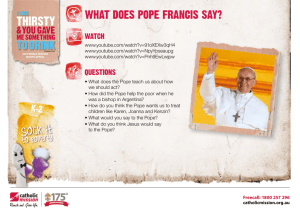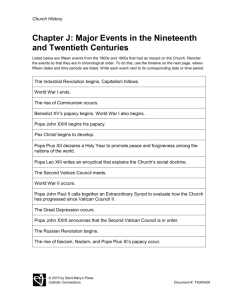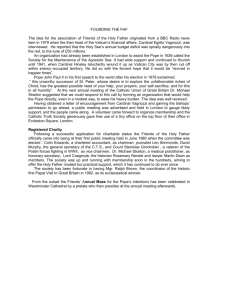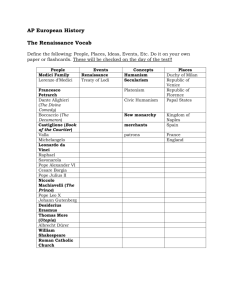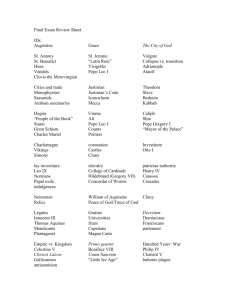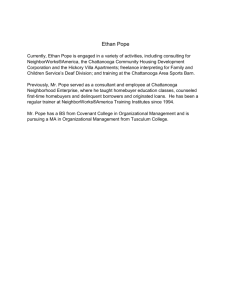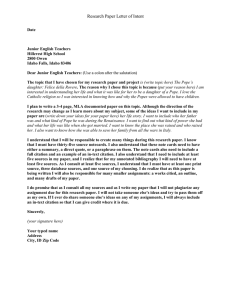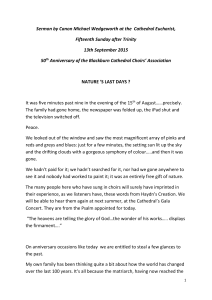Pope On Climate Change Annotation
advertisement
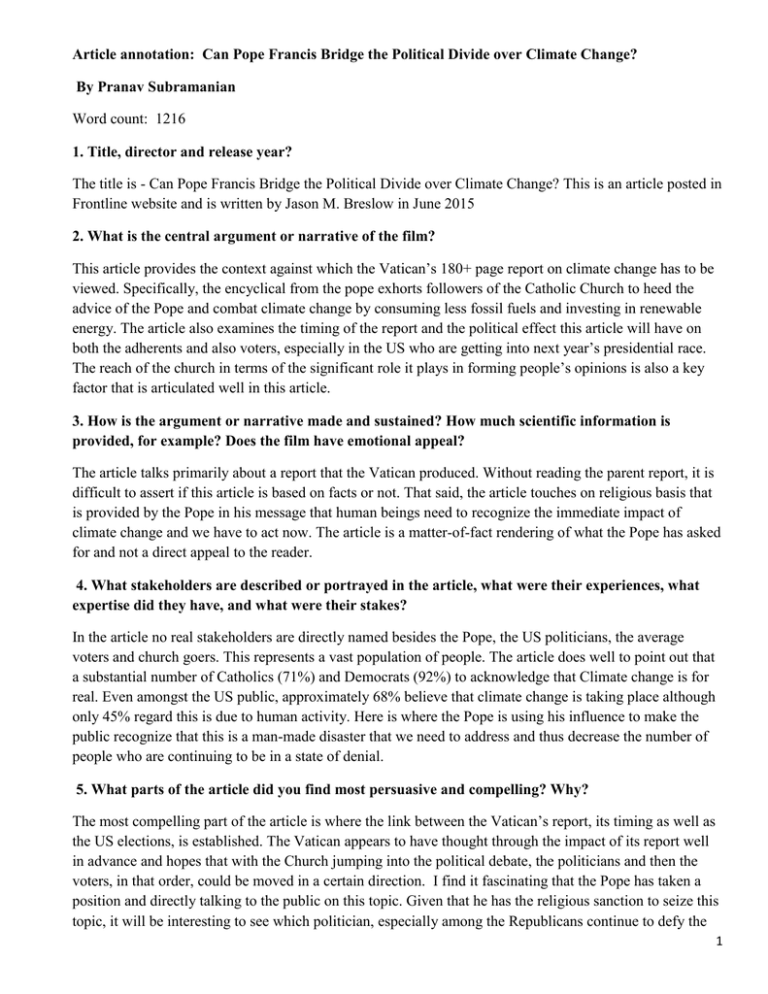
Article annotation: Can Pope Francis Bridge the Political Divide over Climate Change? By Pranav Subramanian Word count: 1216 1. Title, director and release year? The title is - Can Pope Francis Bridge the Political Divide over Climate Change? This is an article posted in Frontline website and is written by Jason M. Breslow in June 2015 2. What is the central argument or narrative of the film? This article provides the context against which the Vatican’s 180+ page report on climate change has to be viewed. Specifically, the encyclical from the pope exhorts followers of the Catholic Church to heed the advice of the Pope and combat climate change by consuming less fossil fuels and investing in renewable energy. The article also examines the timing of the report and the political effect this article will have on both the adherents and also voters, especially in the US who are getting into next year’s presidential race. The reach of the church in terms of the significant role it plays in forming people’s opinions is also a key factor that is articulated well in this article. 3. How is the argument or narrative made and sustained? How much scientific information is provided, for example? Does the film have emotional appeal? The article talks primarily about a report that the Vatican produced. Without reading the parent report, it is difficult to assert if this article is based on facts or not. That said, the article touches on religious basis that is provided by the Pope in his message that human beings need to recognize the immediate impact of climate change and we have to act now. The article is a matter-of-fact rendering of what the Pope has asked for and not a direct appeal to the reader. 4. What stakeholders are described or portrayed in the article, what were their experiences, what expertise did they have, and what were their stakes? In the article no real stakeholders are directly named besides the Pope, the US politicians, the average voters and church goers. This represents a vast population of people. The article does well to point out that a substantial number of Catholics (71%) and Democrats (92%) to acknowledge that Climate change is for real. Even amongst the US public, approximately 68% believe that climate change is taking place although only 45% regard this is due to human activity. Here is where the Pope is using his influence to make the public recognize that this is a man-made disaster that we need to address and thus decrease the number of people who are continuing to be in a state of denial. 5. What parts of the article did you find most persuasive and compelling? Why? The most compelling part of the article is where the link between the Vatican’s report, its timing as well as the US elections, is established. The Vatican appears to have thought through the impact of its report well in advance and hopes that with the Church jumping into the political debate, the politicians and then the voters, in that order, could be moved in a certain direction. I find it fascinating that the Pope has taken a position and directly talking to the public on this topic. Given that he has the religious sanction to seize this topic, it will be interesting to see which politician, especially among the Republicans continue to defy the 1 Church’s position. Also interesting will be the Democratic point of view. Will they, for instance, jump on the ecumenical bandwagon, and make themselves less liberal in the process. It will be an interesting political outcome regardless of one’s political beliefs. 6. What parts of the article were you not compelled or convinced by? Why? While the article makes a pitch for the position that the Church is taking, it is unclear if the Church will show us the way on how one should personally act in response to the climate change crisis. It does not say how the thousands of churches, schools, etc. will be taking the Pope’s message forward. So the message may be more political than practical at this point. 7. What audiences does the article best address? Why? The article appears to be aimed at the average religious person who can be influenced by the Church to acknowledging the need to attend to our planet and combat the problem of climate change. The article, although merely a summary of the church’s position, is still aimed at anyone who has an interest in the affair of the Church and the Pope. Given the Pope’s popularity and his recent US visit, this article is all the more topical for the audience for whom it is intended. 8. What could have been added to this article to enhance its educational value? The article could have touched on the reaction from the various political parties on this report. It also does not say what the reaction was among common public. Such a mention would have further kept the interest of the reader whether the Pope’s message reached its audience or not. 9. What kinds of action and points of intervention are suggested by the article? If the article itself does not suggest corrective action, describe actions that you can imagine being effective. The article talks about the Church position that one should cut reliance on fossil fuels and instead invest in renewable energies. It does not say how to do so, though. As a neutral person reading this article I would like to take the message (and given its scientific basis) do more to remain eco-conscious in my own life. Specifically, I would like to get my own carbon footprint under control. 10. What three points, details or references from the film did you follow up on to learn more? Write short descriptions of what you learned in your search, providing citations. Reading this short report increased my curiosity of what the Vatican is doing to raise awareness on climate change. So I perused the Vatican’s full report. The Pope talks about the devastating effects of climate change, how it is already leading to climate refugees, and how we must work as one community to counter the effects of global warming. I would also like to read up on the positions taken by the current presidential incumbents like Carly Fiorina, Hillary Clinton, and Donald Trump on Climate change. All the candidates seem to be talking about other matters, but their views on climate changes are not at the forefront. I will be following up on this interesting observation. The Pope’s stand on climate change may be the most publicized. There may be other religious leaders who are also talking to followers of other religions. Hence I would also like to understand what leaders of other (e.g., Hindu, Buddhist, etc.) are doing on Climate change. At multiple summits at the UN and at climate 2 conferences, religious leaders from different communities (such as the Evangelical Climate Institute) have called upon the people of the world to work together to end climate change. Citations: Breslow, Jason. "Can Pope Francis Bridge the Political Divide over Climate Change?" PBS. June 18, 2015. http://www.pbs.org/wgbh/pages/frontline/environment/climate-of-doubt/can-pope-francis-bridge-thepolitical-divide-over-climate-change/. 3
